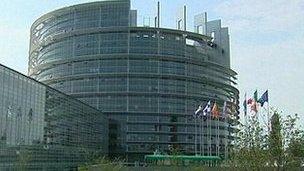Would Midlands be better or worse off out of the EU?
- Published
- comments
Ask a silly question... Is it worth the Midlands staying in the European Union?

"Most voters know little of what goes on within the EU Parliament - and care even less"
And in a way it IS a silly question, because we Midlanders will not decide the answer in isolation from the rest of the country.
As one of my colleagues once memorably put it, "the Midlands is not an island".
Whether or not Westminster's planetary movements after the next election come into alignment with the much-vaunted "In or Out" Referendum, the debate until then is bound to be more a matter of national and supranational arguments than regional and local ones.
So establishing the balance of advantage for our region in staying in or coming out is anything but an exact science.
I recall more than three weeks of utterly pointless toil by a researcher and myself a few years back when we were challenged to draw-up the Midlands' EU profit and loss account: on one side, for example, the grants coming our way from the European Regional Development Fund and on the other, our area's share of the UK's budget contributions.
'Heavy fire'
But the further we delved into it, the more we realised that the numbers were so hedged-around with qualifications, exceptions and subjective judgements that any attempt at an all-embracing arithmetical calculation would be delusory.
How, for example, do you put a price on the Midlands slice of the European Single Market as a whole? How can you put a number on whatever disadvantages, or advantages, may flow from George Osborne's absence from ECOFIN summits while Britain remains outside the eurozone?
That's why the European story is so difficult to tell and why we journalists come under such heavy fire for not doing it justice.
Despite the influence the EU exerts on our everyday lives, mainstream coverage seldom strays beyond the latest tribulations of the eurozone crisis or the regular diet of unchallenging headlines and slogans about its impact on our domestic politics.
Unlike reporting a council or a parliament, we cannot hold our MEPs accountable for how their administration or opposition is going about its business: they all disperse into that spectrum of groupings and alliances within the EU Parliament of which most voters here know little and care even less.
A challenge
Challenging it may be, but that does not mean we shouldn't try.
Especially with less than a year to go to the European Elections and less than two years to go to a general election over which the referendum question is expected to loom large.
This weekend's Sunday Politics Midlands will be taking up the debate.
We will have authored reports by leading figures in the region's business community on opposite sides of the argument.
And I shall be joined in the studio by three of our senior politicians.
The Conservative MP for Stourbridge Margot James was recently appointed to the Downing Street Policy Board, the inner circle of David Cameron's political advisers.
The Labour MP for Birmingham Erdington, Jack Dromey, is a shadow communities minister and former deputy general secretary of the Unite union.
West Midlands MEP Nikki Sinclaire was elected for UKIP three years ago but will fight next year's elections under the banner of the new We Demand a Referendum Now Party which she herself has founded.
This is the last programme in our present series, so an appropriate moment, I feel, for us to take stock of arguably the defining question of our times.
I hope you will join us from 11:00 on BBC One Midlands on Sunday 14 July 2013.
Maybe we'll decide it's not such a silly question after all.